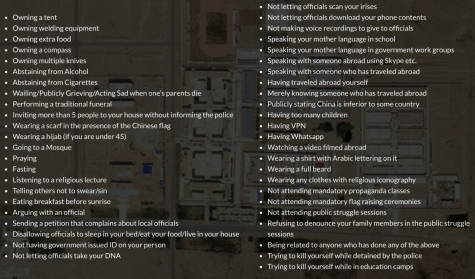The World Needs to Protect the Uighur Muslims
December 4, 2020
Massive concentration camps in China have been holding millions of oppressed Uighur Muslims.
According to the Council on Foreign Relation’s report on the Uighurs and their fight for justice, the Uighur population is “a predominantly Muslim Turkic-speaking ethnic group primarily from China’s northwestern region of Xinjiang.”
Recent research has shown that the Uighur people have been forced to flee their native area in response to the government’s attempts to destroy all evidence of the Muslim religion.
The government claims that the uniqueness of the Uighur culture, religious practices and language displays their disloyalty to the government.
As a result of their “separatism,” the Uighurs are being put into camps the government refers to as “political education camps,” where they are forced to swear their loyalty to the Chinese government and party.
Fantastic panel discussion by @freedomunitedHQ on #ForcedLabourFashion
There are over 1 million Uyghurs, Turkic, and Muslim people in detention and forced labour camps in the Uyghur Region. This is the largest internment of an ethnic and religious group since World War II. pic.twitter.com/xZVwqTXWFa
— The Anti-Slavery Collective (@___TASC_o_rg) December 2, 2020
An interview was taped with a former detainee, Kairat Samarkand, where he recollects his personal experience of the camp.
“At the camp, they taught us the national anthem, songs praising Mao Zedong [founder of the People’s Republic of China], a song wishing 1000 years [of life] to [President] Xi Jinping and the overall great history of China,” Samarkand said.
Up to this point, over 3 million Uighur Muslims have been unjustly captured and put into the containment camps.
Despite China’s consistent claims that the camps are nothing more than re-education camps, anyone who has come out states they are far worse than prisons.
The harsh conditions of the camps that have been mentioned include “crowded cells, only buckets to use as a toilet, violent beatings, reproductive interference towards women, forced medication, rape, severe physical and emotional torture and even death.”
The Uighur devoted website, Save Uighur, estimates that 130,000 Uighurs die every three months inside of these camps.
According to China expert Adrian Zenz, the crisis in China can be considered a cultural genocide rather than a literal genocide.
“I have long argued that the atrocity in the region is a cultural genocide, not a literal genocide,” Zenz said. “I do continue to believe that, generally speaking, the Chinese government does not intend to physically eradicate the Uighurs and Kazakhs, just to integrate, subjugate, dominate and assimilate them. However, this is coupled with a policy of ethnoracial domination, as the government has brought millions of Han Chinese settlers in the regions with promises of high salaries, jobs and free housing.”
In terms of the reasons Uighurs can be put into these camps, there are dozens of excuses behind the government’s actions.

Although this problem has existed since 2017, the issue is only being addressed now because of the making of the live action version of “Mulan.”
With claims of white-washing the genocide occuring towards the Uighurs, the trend of #BoycottMulan was created when the location for the filming was released as Xinjiang, the Uighurs’ native territory.
Demand Disney Remove Mulan from Disney #BoycottMulan https://t.co/kQ9wzzIaLS
— Tanveer (@tanveerafzal73) December 1, 2020
The first accusations were targeted at the movie’s leading actress, Liu Yiefi, who has announced her support for the Chinese government and their decisions, including those made towards the Uighurs.
The accusations continued when Disney sent out a “special thanks” to eight Xinjiang government entities.
One of the entities mentioned, the Turpan Municipal Bureau of Public Security, has several ties to the Uighur containment camps.
As of now, the horrors taking place in China towards the Uighur Muslims are nowhere near over.
The world needs to conduct research on the situation, distribute information to the public and advocate for the Uighurs’ freedom.